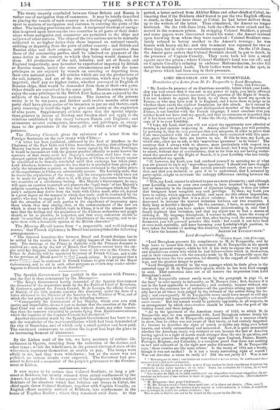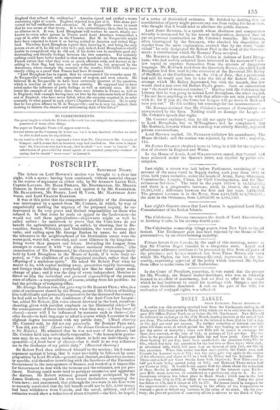LORD BROUGHAM AND M. DE TOCQUEVIJJ,P .
Translation of a Letter from M. De Tocqueville to Lord Brougham. "Paris, 10th February.
" My Lord—In presence of an illustrious assembly, before which your Lord- ship was well aware that it was not in my power to reply, you lately affirmed that 1 had shown marvellous ignorance of the question of the Right of Search. I do not hesitate to appeal, my Lord, to all those who heard my speech in France, or who may have read it in England, and I leave them to judge as to whether there exists the slightest foundation for this attack. As it cannot be supposed that your Lordship, a most distinguished member of the Institute of France, is not familiar with the French language, I must conclude that you neither heard nor have read my speech, and that an erroneous or imperfect idea of it has been conveyed to you. 1 take the liberty, therefore, of forwarding a copy of it to your Lordship. " I hope, my Lord, that you will not reject the opportunity now afforded of forming a just opinion respecting it. Among other things, you will perceive, by perusing it, that the very passages that you misquote, in order to prove that 1 am unacquainted with the most elementary facts connected with this ques- tion, prove that these facts are known to me. If this be true, my Lord, on which side, allow me to ask, is this ' marvellous ignorance' to be found ? The courtesy that I always wish to observe, more particularly with respect to a foreigner, prevents me from saying more on this head ; but 1 may be permitted to assert, without fear of contradiction, that so far from any not having under- stood the question of the Right of Search, it is your Lordship who has totally misunderstood my speech.
"If, however, my Lord, you bad confined yourself to accusing me of what you are pleased to style my marvellous ignorance,' I should not have thought it incumbent on me to reply. But certain journals assert, that you went fur- ther, and that you declared, or gave it to be understood, that 1, actuated by party-spirit, sought to envenom the unhappy differences existing between the two nations.
" This, my Lord, cannot be allowed to pass as a mere pleasantry ; and although your Lordship seems in your own country to have acquired by long habit a sort of immunity in the employment of injurious language, it does not follow that foreigners must recognize any such privilege. If, then, my Lord, you have in reality, which appears doubtful, cast upon me this odious imputation, I must tell you plainly that it is a sheer calumny. It is not true that I en- deavoured to increase the mutual irritation between our two countries. I flatly deny so hateful a thought. On the contrary, I have, in several parts of the speech of which you have spoken without understanding it, said that I deeply deplored that irritation, and that my object was to find a means of calming it. My language throughout, I venture to affirm, bears the stamp of this conciliatory spirit. I doubt not that, after having read the accompanying document, you will yourself perceive this truth : but would it not have been at once more equitable, and more becoming your Lordship's high position, to have taken the trouble cf making this discovery before you spoke ?
"Grafton Street, 14th February. "Lord Brougham presents his compliments to M. de Tocqueville, and he begs leave to assure him that he mentioned M. de Tocqueville in his speech with great personal respect, while he felt it his duty to expose the very great and mischievous errors into which he had fallen—errors which in themselves, and in their connexion with the remarks made by M. de Tocqueville upon the relations between the two countries, led directly to the support of hostile feel- ings, and the greatest danger to peace. "Lord Brougham referred to the very passages which he finds given in the corrected copy of AL de Tocqueville'a speech, which he has been kind enough to send. That correction does not at all remove the impression from Lord Brougham's mind. "31. de Tocqueville cannot surely mean by the paragraph in page II, at the foot,* to refer merely to indemnity, as M. I3erryer does ; first, because it is not in the least applicable to indemnity ; and secondly, because without any treaty—by the common law of nations—all the questions arising upon indem- nity have at all times been judged by the tribunal of the nation doing the in- jury ; and consequently M. de Tocqueville never could have meant to call any such universal and long-established right, 'rine disposition singuliere extraordi- noire inouie.' But his remark would he perfectly applicable, in all respects, to an arrangement by which slave-traders should be taken into the port of the visiting vessel, and there judged. " As to the ignorance of the American treaty of 1823, to which AL de Tocqueville says he was acquainted with, Lord Brougham retains firmly his former opinion, that M. de Tocqueville expressed himself in a manner clearly to show, that he either was not aware of that treaty, or had entirely forgotten it ; because he describes the right of search as unlike any thing ever before known, and wholly extraordinary and unheard of. Now, it is quite immaterial whether the American treaty was retained or not, because the fact of America having agreed to a right of search much stronger than the one in question, and having even pressed the adoption of that right upon England, France, Russia, Portugal, Belgium, and Columbia, is a complete proof that there was nothing so new and unheard-of in the right now under discussion. M. de Toequeville says,' these treaties are like none others.' Is the treaty of 1834 not a treaty, though it was not ratified ? Is it not a treaty containing right of search ? Was not America anxious to ratify it ? Did she not .ratify it ? Was it not • " Remarquez-le Bien cos trains sic ressemblent a aucun autre; its contiennent deux snesures tout d fait estrcordinaires.
" D'abord its donnent is la force almee dune nation le droit exorbitant (ranker lea crimiuela d'une entre nation ; et oil cola? Dans les solitudes de l'ocean, lit oil tout pent se faire. on tout peut se supposer.
" Les traites de HMI et de 1833 contiesnent une disposition tout aussi singuliere, its ac- eordent au tribunal d'une nation le draft de juger use tuition etningere. (Reclamatious an centre.) " M. BERRIZEH— Old, pour Vindetunite. " M. DE TOCQUEVILLE—Voici dans quel cas: si la chose est &Odic. (Non, non I)
" Eh Bien, je dis qua des trellis dune espece si extraordinaire si inouie, si contours aux habitudes de tastes les nations civilisies."
The wards in Italics are not to be found in the report iu the Del att. England that refused the ratification ? America signed and ratified a treaty containing right of search. England objected to a part of it. This alone pre- vented its full ratification and execution. M. de Tocqueville seems to assert that he was aware of that treaty. It is very extraordinary, then, that he made no allusion to it. It was, Lord Brougham will venture to assert, wholly un- known to every other person in France until Lord Aberdeen transmitted a copy of it, after the debate in the Chamber. But M. de Tocqueville might have been expected to know it as having resided in America and visited Eng- land. Therefore Lord Brougham regrets that, knowing it, and being the only person aware of it, be did not refer to it ; and, indeed, Lord Brougham is wholly unable to comprehend why he did not, if his desire was to maintain good un- derstanding and friendly feelings between the two countries. For certainly nothing could have better tended to that most beneficial end, than showing the French nation that what they were so much offended with, and deemed so in- sulting to their flag, had been not only submitted to, but proposed by the Amencans, whose example the enemies of the treaties 1831-1833 were con- stantly citing as a proof that France had been ill-treated.
"Lord Brougham has to repeat, that he accompanied his remarks upon M. de Tocqueville s conduct with expressions of respect, and even esteem. He believed M. de Tocqueville to have been extremely ignorant of the question, which is familiar to all lawyers in this country. He supposed him to have acted under the influence of party feelings as well as national ones. He fol- lowed the example of all times since there were debates in France as well as in England; that example having been set him by the statesmen both of France and of England, who have never failed, when the occasion required it, to refer mutually to what passed in each other's Chambers of Parliament. He is sorry that he has given offence to M. de Tocqueville; and he is very far, indeed, from desiring to imitate the abusive and unbecoming style of his letter."



























 Previous page
Previous page